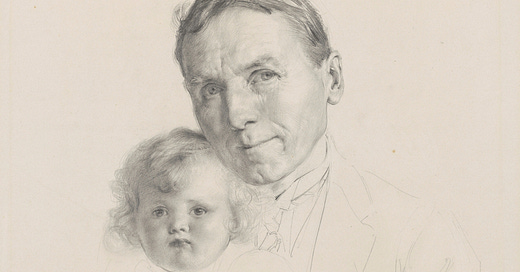Fatherhood and marriage, redux.
A good faith debate about whether fathers need to be husbands
Note: this article was first published over at Fairer Disputations, including with this image. If you don’t know the folks writing over there, you should check it out.
It’s no exaggeration to say that the relationship between marriage and fatherhood is one of the most important questions of our time. With the decline in marriage, and the attendant and damaging rise in fatherlessness, it is important to approach the question in the best faith possible. The stakes are too high for straw-man culture-war nonsense. So thank God for scholars and writers like Leah Libresco Sargeant, who is engaging in this question with a combination of compassion and realism. (Check out her excellent Substack, “Other Feminisms”).
She and I have had some of the most in-depth conversations and exchanges about how far marriage is an essential means to the end of engaged, responsible fatherhood. Her article here at Fairer Disputation extends that conversation, by way of a thoughtful critique of a post I wrote, titled “Why fatherhood and marriage don’t have to go together.”
There are huge areas of agreement between us, including the strong claim, still not entirely uncontroversial in progressive circles, that fathers matter hugely, and not only as economic providers but as parents in their own right, bringing something different and complementary to the task of raising children well. As Sargeant writes:
Men need to know what they can uniquely contribute to their family. The abiding presence of a father isn’t replaceable by their paycheck, their banked sperm, or their weekend visits. Men and women both are impeded in knowing themselves and the full potential of their relationship when fathers are treated as trivial.
I emphatically agree. For anyone who needs convincing that fatherhood matters, I recommend the work of evolutionary psychologist Dr Anna Machin and especially her book, The Life of Dad. In a recent podcast interview with Chris Williamson, Machin took on the argument that fathers are less important now that women have achieved so much economic independence:
What that really misses is actually fathers aren’t really there for mothers. Fathers are there for their children. So… as a woman. I’ve got my own money, I can protect myself. But your kid needs the input from that father, because actually what fathers bring to their children is very different from what mothers do… From an evolutionary point of view, fathers actually have a very separate, unique and important input into their children’s development.
The question at hand is not whether fathers matter. It is whether marriage is a necessary institution for bringing fatherhood to life. In recent history, it certainly has been the main one. So as marriage has fallen away, except for the most affluent and educated, fatherhood has fallen with it. Unfortunately, I know of no policy to increase marriage. Even a scholar as strongly in favor of marriage as Melissa Kearney finds really no evidence, in her brilliant new book The Two-Parent Privilege, for successful pro-marriage policies.
Now, there is no doubt in my mind that it is typically much easier for a father to be involved in his children’s life if he shares a home with their mother. I think that’s just common sense. It’s also been my own personal experience. It takes more work, and more planning, to co-parent when you are not a couple. There is also some loss in the day-to-day, organic interaction that makes up so much of family life.
The note that Sargeant got from her reader “Gabs,” lamenting some of the lost “little, every day, unchosen moments with her dad” really struck a chord with me. That’s one reason why, if possible, mothers and fathers should get equal time with their children after separation.
But this is one of those occasions where we must be very careful not to make the perfect the enemy of the good. Two out of five children are now born outside of marriage, and there’s little sign of that number dropping. Whether we like it or not, we have to find a way to reboot fatherhood for the world as it is, rather than the world as it was.
This will take time, for sure. The social and economic changes of recent decades have been so dizzyingly fast that it is no wonder we are all struggling to make sense of them. But I’m hopeful it can be done. After all, fatherhood has been around for about 750,000 years, and the first recorded marriage was only about 4,000 years ago.
None of this is to knock marriage. Marriage is a beautiful, sacred, precious institution. It is simply to say that fatherhood is all of those things too, even outside of the married state.





“Men need to know what they can uniquely contribute to their family. The abiding presence of a father isn’t replaceable by their paycheck, their banked sperm, or their weekend visits. Men and women both are impeded in knowing themselves and the full potential of their relationship when fathers are treated as trivial.” Wow.
That this is even debatable reminds me of the quote “we are living in post-nuance times”. Everyone has an anecdote as to why marriage is good or bad and the nuanced truth is it depends on what we bring to the marriage. Twenty years in men’s groups tells me generally speaking marriage makes for better men which translates to better fathers and partners and neighbors and employees. Mostly because a legal commitment reduces uncertainty during the inevitable hard and uncertain times. Kids without married fathers (or no fathers) aren’t doomed anymore than kids who grow up without mothers are. Kids who aren’t loved however will struggle deeply - how we are treated as children is generally how we will treat ourselves and others for the rest of our lives. Again generally.